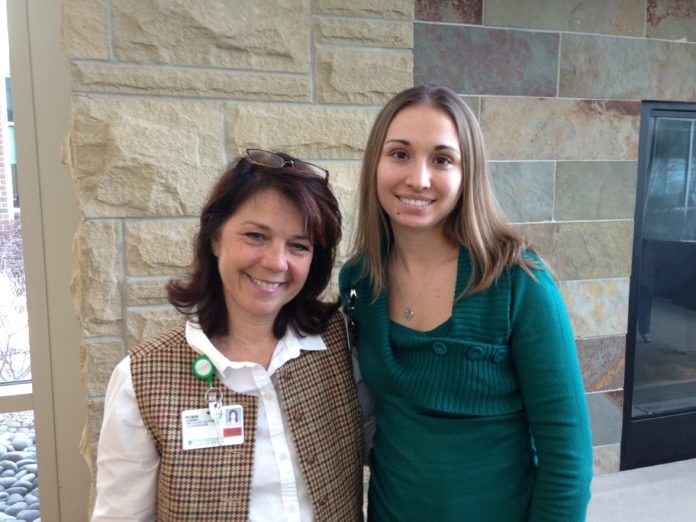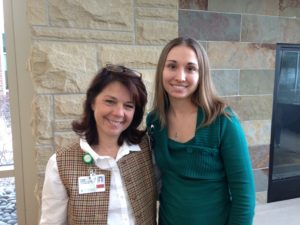
Thanks to improved treatments and highly publicized fundraising events, cancer isn’t the taboo subject it once was.
However, there are still some types of the disease people don’t want to even think about.
Hello, colorectal cancer.

It seems pretty much no one wants to talk about colonoscopies, although the screening method could prevent more than 90 percent of colorectal cancers if everyone had one at the age of 50, according to the American Cancer Society (ACS). Those with a family member who developed colorectal cancer before the age of 60 are advised to get their first colonoscopy at the age of 40.
Two women from the Hickman Cancer Center at ProMedica Flower Hospital hope to take away some of that stigma surrounding colorectal cancer. March is National Colorectal Cancer Awareness Month.
“We can prevent more cancer if people go in and have their colonoscopies,” said Kelly Morse, a licensed genetic counselor with ProMedica Cancer Institute. As part of her job, Morse talks with patients and their family members about preventing or catching cancer early, particularly with those who have a family history of the disease.
“Even with colonoscopies, there’s a stigma. People say, ‘Oh, I’m not doing that,’” Morse said. “It’s always ‘Oh, I’ve heard they’re terrible. Oh, I don’t ever want to have that done. Nobody’s doing that to me.’ Or the biggest one is, ‘I’m afraid of what they’ll find.’ Well, delaying it further is just going to make it worse. Trying to bring people to that realization is just really, really hard.”
Robin Sulier-Charney, an outreach coordinator with ProMedica Cancer Institute, goes out in the community to help raise awareness of cancer prevention and early detection. Any one of the 3,500 people who walked through a 20-foot, inflatable colon dubbed “Super Colon” at a Mud Hens game last year has Sulier-Charney to thank for that experience.
The blow-up colon will make another appearance March 20 at the Toledo Walleye game at the Huntington Center.
For Sulier-Charney, who wears a turquoise “I heart booty!” bracelet, it’s all about community awareness.
“It is almost a completely preventable cancer,” she said. “I would love to see people go in to their doctors and say, ‘Can you help me with my family history and what are my options for screening?’ Just to start that conversation, we could reduce the incidence of colorectal cancer by a pretty substantial rate.”
More than 50,000 Americans were expected to die from colorectal cancer in 2014, according to ACS.
The Lucas County Colorectal Cancer Coalition (LCCCC), a small group of community activists dedicated to colorectal prevention, states that Lucas County has one of the highest late-stage diagnosis rates in Ohio, with the cancer being the second-leading cause of cancer deaths in the county.
Although rarely discussed, people who have died from colorectal cancer include Audrey Hepburn, Charles Schulz, Jack Lemmon and Vince Lombardi.
As of five years ago, only 59 percent of Americans above the age of 50 had received any sort of colorectal cancer testing, according to the ACS.
“An early diagnosis is the closest thing we have to a cure,” Sulier-Charney said.
According to the ACS, colorectal cancers start as a polyp, an abnormal, fleshy growth in the colon. Polyps are not necessarily cancerous, although those identified during a colonoscopy can be removed before they become cancerous. Symptoms of colorectal cancer do not appear until the polyp is large enough to cause bleeding or colon blockage. Early-stage colon cancer shows no symptoms.
Hence, the need for screenings.
“The vast majority of colorectal cancers are sporadic and randomly occurring,” Morse said. “The way we’re going to identify those in people is through routine screenings.”
Although guidelines for the general population maintain getting a colonoscopy by the age of 50 (and every 10 years afterward), those with a family history may need to take a more aggressive approach.
One in 35 colon cancer cases is due to Lynch syndrome, a genetic disorder that predisposes a person to develop certain types of cancer. Someone with Lynch syndrome has a nearly 80 percent chance of developing colon cancer, Morse said.
According to the LCCCC, a colonoscopy involves the doctor using a flexible, hollow tube about the width of a finger to inspect the entire colon. The exam takes about 15-30 minutes, while the patient is sedated. About 12 hours of fasting is required, as well as the consumption of a liquid that will help clear out the colon.
Identifying cancer in one’s body can be a scary proposition, but it’s one that can save their life, said Sulier-Charney, who has overcome a personal battle with cancer. She has had two colonoscopies herself.
“When people think of cancer, they’re frightened and the first thing they think of is death,” she said. “They think of worst-case scenarios. But it is far from that. We have so many things that we can help people do before it even gets to that point.”
There are ways for most people to reduce their risk of developing colorectal cancer, such as eating a higher-fiber diet, increasing physical activity, limiting alcohol consumption and reducing the amount of red and/or processed meat consumed.
“The most important thing that I want to get through is save yourself a lot of heartbreak, time and money: know what your risks are, know what you need to do, talk to your doctor and be an advocate for yourself,” Sulier-Charney said.
For more information, visit toledocolonhealth.org and cancer.org






















